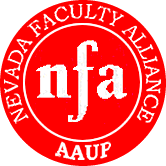There is much discussion taking place this week
in Nevada,
in Wisconsin, and and
nationally, about public service worker retirement plans, including
excellent debunking of ridiculous claims about "unfunded liabilities" in public service worker pension funds are the cause of state budget shortfalls nationally (
data shows its most closely correlated to the collapse of property values)
In this context, its worth making a point that is rarely mentioned and not very widely known: that higher education faculty in many states, including the vast majority of NSHE faculty in Nevada, are not in the state's Public Employees Retirement System (PERS) and instead have a
"Retirement Plan Alternative" .
That is over 90% of NSHE faculty and professional staff (including all new hires) have a
defined-contribution (ie, "401K-style") retirement plan. These plans are
- mandatory
- self-managed (faculty choose to invest among several approved institutions)
- funded equally by employees and employer
- fully vested immediately and thus portable
- supervised within NSHE and so without administrative cost for the state
- without post-retirement liability for the state
In effect, these plans seem to be close to, if not, the model on which advocates of "public employee pension reform" base their proposals. (This is not to take a position on whether such a retirement plan would be appropriate for classified state workers; it is merely to remark that Nevada seems to be well served by this arrangement with NSHE having an autonomous retirement plan for faculty outside of PERS.)






Great that these facts were pointed out!
ReplyDeleteI most certainly dislike "defined contribution" plans. My father (long past away) -- a high school teacher -- had better retirement benefits than I will ever have. Of course, the Nevada citizenry is clueless about all this and will give no credit for the lack of adequate retirement.
- Wolfgang Bein,
Professor, UNLV
twitter.com/wwbein
In a defined contribution plan, the employee and employer pay into a retirement fund that invests in the stock market (and bond market). If the stock and bond market does well, the employee's retirement fund does well. But if the market is down, it's just tough luck for the retired employee. In other words, it's a gamble.
ReplyDeleteIf you retire when the stock market is down, you face a shrunken retirement fund. The employee doesn't have any control over when the employee turns 65 or 70. That's a big disadvantage of defined benefit plans. After the stock market crashed in 1929, it didn't recover until the early 1950's.
There are some truly outrageous pension examples out there, but they're not for public employees: it's for top executives in private companies. When Eric Schmidt stepped down as CEO of Google in January, he received $100 Million.